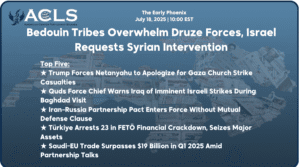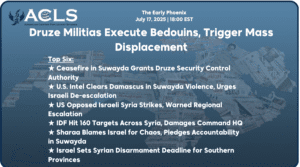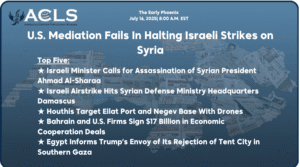TOP HEADLINES:
- Turkiye Roasts as Extreme Weather Fuels Wildfires, Disrupts Air Traffic
- Iran Prisoner Deal ‘Dangerous Precedent,’ Warns Ex-Secretary Pompeo
- American Deterrence Forces Approach Strait of Hormuz in Response to Iranian Threats
- Iraq’s National Security Council Approves Joint Strategic Agreement with US
- Saudi Arabia and UAE Secure Nvidia GPUs in Race to Build an AI Industry
TURKIYE
- Turkiye Roasts as Extreme Weather Fuels Wildfires, Disrupts Air Traffic (Al Monitor). Turkiye is grappling with multiple wildfires and extreme weather conditions, including high heat and humidity…Fueled by the extreme heat, at least 10 wildfires have been reported this week in various regions including the southeast and the Aegean and Mediterranean coast.
- Russian Raid Off Turkey’s Coast Tests Erdogan’s Resolve (Reuters). Russia’s recent raid on a ship near Turkey’s coast has brought the fallout from the Ukraine war to another NATO frontier, raising concerns about the Black Sea’s volatility. Armed marines boarded a Turkish-based vessel off Turkey’s northwest coast, prompting Russia’s inspection before the ship sailed to Ukraine. Turkey’s silence on the incident indicates its desire to revive a UN grain deal with Russia and maintain good relations with President Vladimir Putin, whom President Tayyip Erdogan has invited to Turkey for talks. The incident tests Turkey’s position as it seeks to balance its interests in the war and its economic cooperation with Russia.
- Türkiye Awaits Lagging Sweden to Fulfill Extradition Requests (Daily Sabah). Turkey is awaiting Sweden’s response to its extradition requests for terrorists and hopes that Sweden will fulfill its commitments not to provide shelter to terrorists and supporters of terrorists as part of its NATO membership bid. Turkey had approved Finland’s NATO membership but is waiting for Sweden to demonstrate its commitment to counterterrorism efforts. Turkey’s Justice Minister Yılmaz Tunç stated that terrorism is a common enemy and democratic countries should unite to fight it. The Turkish Parliament will consider Sweden’s response when discussing the ratification of its NATO accession bid.
- Russia Makes a Surprising Offer to Türkiye on Maritime Collaboration (Yeni Safak). Russia has expressed interest in establishing a partnership with Turkey in maritime activities, as the Federal Service for Military-Technical Cooperation (FSVTS) Director Dmitriy Shugayev announced. Shugayev highlighted Russia’s readiness for collaborative efforts with Turkey in the maritime sector, although specific details about potential military-technical cooperation within this domain are not yet being discussed. These comments were made during the “Army-2023 Forum,” a significant defense industry event in Russia that features participation from numerous defense sector enterprises and foreign companies.
ISRAEL & PALESTINIAN TERRITORIES
- Intel Backs Out of $5.4 Billion Deal to Buy Israeli Firm Tower Semiconductor (Reuters). Intel has canceled a $5.4 billion deal to acquire Israeli semiconductor company Tower Semiconductor due to its failure to obtain approval from Chinese regulators, as required by the contract. As a result of the cancellation, Intel will pay Tower Semiconductor $353 million. Tower Semiconductor has been a manufacturer of analog semiconductor chips for various sectors for nearly 30 years. The deal’s cancellation comes as Intel seeks to advance its integrated device manufacturing strategy and expand its chip manufacturing facilities. This would have marked Intel’s sixth acquisition of an Israeli company in recent years.
- Soldiers Clash with Palestinian Gunmen Near Nablus, Destroy Explosive Lab (Times of Israel). Israeli soldiers clashed with Palestinian gunmen near Nablus in the northern West Bank, detaining one assailant who opened fire at a military post. The troops seized the gunman’s assault rifle, a grenade, military equipment, and magazines. Meanwhile, Israeli forces, including the Yahalom combat engineering unit, entered the Balata refugee camp and destroyed an explosives lab and storage site, finding and detonating around 15 primed makeshift bombs. Palestinian rioters and gunmen confronted soldiers during the operation, but no soldiers were reported injured. Violence has escalated in the West Bank, including shootings, arrest raids, and settler attacks, resulting in casualties on both sides.
EGYPT & NORTH AFRICA
- Libya Awaits the Fate of Consensus Between the House of Representatives and the State (Al-Mashhad Libya). Ambiguity in Libya still surrounds the position of the High Council of State and its new president, Mohamed Takala, regarding the fate of the Council’s previous agreements with the House of Representatives relating to electoral laws and the implementation of a “road map” that includes the formation of a new government in the country. In light of the lack of Takala’s statements…several parties in the political arena are now waiting for the next session of the Supreme Council of the State to know its positions on several issues more precisely.
- Sisi Says Egypt Will Establish Border Logistics Zone with Libya (Al-Saaa 24). Egypt intends to establish a new logistical area near the Salloum land crossing on the border with Libya, which it developed recently, to create the western region and enhance trade movement with its neighbor. Many projects target Matrouh Governorate, whether in terms of ports or the express train that will reach the city of Salloum on the Libyan border. The logistics area will cover more than one million square meters near the port.
GULF REGION & YEMEN
- Houthis Tax Yemen Government-Controlled Port Imports (Arab News). The Iran-backed Houthis have slapped a 100 percent levy on items imported through government-controlled ports, the latest in a series of moves aimed at straining Yemen government finances. The Houthi Ministry of Finance said that any products imported through Aden port and other government-controlled ports or land crossings would be subject to the same tax and customs fees as those imported through the port of Hodeidah when they pass through their checkpoints. Traders must pay the taxes in cash at Houthi checkpoints in Sanaa, Taiz, and Al-Bayda to enter markets controlled by the militia.
- American “Deterrence” Forces are Approaching the Strait of Hormuz in Response to Iranian Threats (Al Sharq Al Awsat). The United States is strengthening its military presence in the Gulf waters to deter Iran’s increasing threats to ships and oil tankers, as it recently announced, and in a step that Washington aims to enhance its role in protecting the strategic region…The amphibious assault ship USS Bataan and the landing ship USS Carter Hall approached the Strait of Hormuz after arriving earlier this week in the Gulf of Oman.
- US Beefs Up Gulf Deployment Over Iran Oil Tanker Threat (New Arab). The United States is increasing its military presence in the Gulf region as Iranian seizures threaten oil tankers in the Strait of Hormuz. Three thousand additional US personnel on troop-landing warships have passed through the Red Sea, and US-led maritime forces are cautioning ships against approaching Iranian waters. This move follows a series of ship captures and attempted captures in the region. The US military has stated that Iran has seized or tried to take nearly 20 internationally flagged vessels in the past two years. The US aims to strengthen security and stability in the critical waterway and is considering unprecedented measures, including putting Marines and Navy personnel aboard commercial tankers. Tensions and incidents persisted while a prisoner release deal was reached between the US and Iran.
- Saudi Arabia and UAE Secure Nvidia GPUs in Race to Build an AI Industry (The New Arab). Saudi Arabia has bought 3,000 of Nvdia’s latest H100 GPUs for $120 million, with the UAE buying thousands more, according to the Financial Times. Each GPU costs $40,000 and has been described by Nvidia president Jensen Huang as “the first computer [chip] in the world designed for generative artificial intelligence.”…It comes as the two countries accelerate their ambitious development plans, known as Vision 2030 in Saudi Arabia and Vision 2031 in the United Arab Emirates, which aim to shift their economies away from the oil industry.
IRAN
- Iran’s Oil Exports to China Hit 10-Year High (Al Monitor). Iran’s oil exports to China have reached a 10-year high, with August seeing 1.5 million barrels per day of crude oil exported, the highest level since 2013. This export increase comes as Iran and China grow closer politically and economically. China has become Iran’s top trading partner since 2022, and Iran’s oil output, affected by US sanctions, is now rising again. China is Iran’s largest oil customer, and the increase in exports is also attributed to China easing its probe into imports of bitumen, sometimes disguised as Iranian crude.
- China Ready to Boost Military Cooperation with Iran (Islamic Republic News Agency). Chinese Defense Minister Li Shangfu has expressed China’s willingness to enhance military cooperation with Iran as part of the Shanghai Cooperation Organization (SCO). He stated that China is prepared to strengthen security and defense collaboration with Iran and Belarus within the framework of the SCO. Shangfu also mentioned the potential for joint military drills, exercises, and increased international cooperation in arms control and non-proliferation. He emphasized that the Sino-Russian army alliance is not directed against any third country. The remarks were made at the 11th Moscow Conference on International Security, where an Iranian military delegation participated.
- Iran’s Space Organization to Carry Out 30 Launches in 7th Development Program (Tasnim News Agency). The Iranian Space Organization has announced its plan, approved by the Seventh Development Program Commission, to carry out 30 launches during the seventh program. The spokesperson, Hossein Dalirian, stated that the organization is focused on revitalizing and advancing space programs to achieve 30 research and operational launches within five years. He highlighted the successful execution of 7 launches under the thirteenth administration and emphasized the importance of support from the administration and parliament for realizing space initiatives. The plan aims to solidify space technology and align with the country’s 10-year space program.
- Iran Prisoner Deal ‘Dangerous Precedent,’ Warns Ex-Secretary Pompeo (Iran International). The former US Secretary of State, Mike Pompeo, has expressed concern over Iran’s recent prisoner release deal, stating that it sets a “dangerous precedent.” The deal involves the release of five US citizens unlawfully held in Iran in exchange for at least $6 billion of funds from South Korea. Pompeo believes such a deal will encourage more hostage-taking by Iran and strengthen the Iranian economy. He warns that the Biden administration’s approach to dealing with Iran is bending towards appeasement. Additionally, there are concerns that the deal could embolden Iran and potentially lead to further hostage-taking.
- Iranian Minister Confirms Suspension Of Petrol Imports From Russia (Iran International). Iran’s Minister of Petroleum, Javad Owji, has confirmed the suspension of gasoline imports from Russia, leading to a domestic production and supply focus for Iran’s gasoline needs. This move follows initial plans to import up to 10 million liters of gasoline daily from Russia to address supply-demand gaps. Despite the suspension and existing petrol shortage crisis, Owji claimed there is no supply issue and mentioned a parliamentary requirement for individuals to use personal cards for refueling. The result of this suspension has led to reduced gasoline shipments to gas stations, long queues, and a black market for gasoline at inflated prices.
- Congestion at Gas Stations as Iran’s Fuel Crisis Deepens (Iran International). Shortages of gasoline in Iran, refueling limits, and rumors of an impending price hike have led to long queues at gas stations across the country. Despite repeated denials of a fuel crisis by government media — which blame the disruption in the supply chain on summer travels — Iranians see the long lines of cars as a prelude to protests that may engulf the country even before the anniversary of last year’s protests in mid-September. The congestion at gas stations started in small towns and cities earlier in the month. Still, as of Tuesday, numerous videos have emerged on social media showing long queues of vehicles waiting to fill up in the capital Tehran, Kerman, Karaj, and Kermanshah, and several cities in border provinces.
SYRIA
- Switzerland Issues Arrest Warrant for Assad’s Uncle for Hama 1982 War Crimes (Dstouria). The Swiss Federal Criminal Court (FCC) has ordered the Federal Office of Justice (FOJ) to issue an international arrest warrant for former Vice President Rifaat al-Assad in connection with the proceedings he has been facing since 2013 for his alleged role in the massive war crimes committed in the city of Hama in February 1982. TRIAL International calls on the Swiss authorities to swiftly indict and bring to trial the man nicknamed the “Butcher of Hama”, now aged 85.
- Jordan Shoots Down Explosive-Laden Drone Coming from Syria (Al Sharq Al Awsat). The Jordanian army shot down a drone coming from Syria and loaded with explosive materials…The agency quoted an official military source in the General Command of the Jordanian Armed Forces – the Arab Army, as saying: “The Border Guard forces, in coordination with the Drug Control Department and the military security services, detected an attempt by a drone to cross the border illegally from Syrian territory to Jordanian territory.”
- Kurdish Sources Claim Iran is Mediating Talks Between SDF and Assad Regime in Damascus (Syria TV). The Basnews website, which is close to the Iraqi Kurdistan government, quoted a Syrian Kurdish source, whom it described as a source, as saying today, Wednesday, that secret negotiations are taking place between the Syrian Democratic Forces (SDF) and the Syrian regime in Damascus under Iranian sponsorship to neutralize any SDF participation with the international coalition in any possible strikes against Iran’s militias in Syria.
IRAQ
- Iraq’s National Security Council Approves Joint Strategic Agreement with the US (New Arab). On Monday, August 14, Iraq approved the outcomes of a Joint Security Cooperation Dialogue (JSCD) with the United States to form a joint high committee with the US-led global coalition against the Islamic State (ISIS)… “Following the briefing, the Council approved the Iraqi delegation’s agreement with the United States to form a joint high committee with the Global Coalition Against Daesh, aimed at implementing the joint dialogue’s outcomes,” [spokesman] Rasool added. “In this context, the Armed Forces Commander-in-Chief instructed the Army’s Chief of Staff to engage with the Global Coalition Against ISIS leadership in Iraq to initiate the bilateral committee’s operations.” Rasool also indicated that the council approved Iraq’s accession to the international database for lost and stolen weapons, “aiming to enhance control over these arms.”
- Political Source: Al-Sudani Donates Iraqi Oil to Lebanon for Free, By Iranian Order (Al Iraq News). A political source said on Wednesday, that “the file of Iraqi fuel to Lebanon was not based on the exchange of funds between Iraq and Lebanon, but rather on Iraq providing Lebanon with fuel free of charge by Iranian order.” He pointed out that “Lebanon, until now, has not paid a single cent of the price of the fuel, and did not provide any service in exchange for that.”
- Economist: Turkey Imposes (6) Conditions on Iraq in Return for Re-Exporting Oil through its Port (Al Iraq News). Iraqi economic expert Nabil Al-Marsoumi identified six conditions that Turkey places on Iraq in return for re-exporting oil through the port of Ceyhan…First: stopping the application of the clearing agreement between Iraqi oil and Iranian gas, because Turkey and Kurdistan have an agreement on oil for a period of 50 years. Second: Paying compensation for resuming the Kurdistan region’s oil exports. Third: The withdrawal of the second lawsuit by Baghdad at the International Court of Arbitration for compensation for the period 2018-2022. Fourth: Continuing to give Turkey a discount of $13 on each barrel of crude oil exported from the Kurdistan region. Fifth: Continuing to pay transport fees to the Turkish company BOTAS in the amount of 7 dollars for each barrel of crude oil exported through the Turkish port of Ceyhan. Sixth: That Iraq bear the cost of repairing the Iraqi-Turkish pipeline.
LEBANON
- After Deal with Israel, an Offshore Rig Arrives in Lebanese Waters to Drill for Gas (Times of Israel). An offshore drilling rig has arrived off Lebanon’s coast in the Mediterranean Sea and is set to begin operations in the coming weeks to search for gas. The drilling is expected to occur in Lebanese waters near the border with Israel, following a maritime border agreement between the two countries. Lebanon aims to discover gas reserves to alleviate its severe economic and financial crisis. The drilling rig is located near Tyre, and the drilling results are anticipated in two or three months. The gas exploration is being undertaken by an international consortium that includes TotalEnergies, ENI, and Qatar Energy.
- UNIFIL Commander Urges Lebanon and Israel to Resolve Border Tensions Before Security Council Renews UNIFIL Mandate (Al Naharar). The Commander of the United Nations Interim Force in Lebanon (UNIFIL), Aroldo Lázaro, has expressed concern about a series of incidents along the border in recent months that have increased tension. He urged the Lebanese and Israeli sides to “continue to benefit from the liaison and coordination mechanisms undertaken by UNIFIL while avoiding unilateral measures.”…During his tenure, Lazaro called a tripartite meeting with senior officers of the Lebanese Armed Forces and the Israeli army at the United Nations site in Ras Naqura,
- US Treasury Sanctions “Green Without Borders” for Supporting Hezbollah (Al Sharq Al Awsat). On Wednesday, the United States imposed sanctions on the “Green Without Borders” association in Lebanon, accusing it of being an organization that covers up with “false environmentalism” to “hide the terrorist activities” of “Hezbollah” along the Blue Line with Israel…The Office of Foreign Assets Control of the US Department of the Treasury (OFAC) stated that it had placed the “Green Without Borders” association in Lebanon and its director, Zuhair Subhi Nahla, within the terrorism-related sanctions lists, explaining that the association “provided support and cover for Hezbollah operations in southern Lebanon along the Blue Line between Lebanon and Israel for the past decade while it has been operating openly under the guise of environmental activism.”



